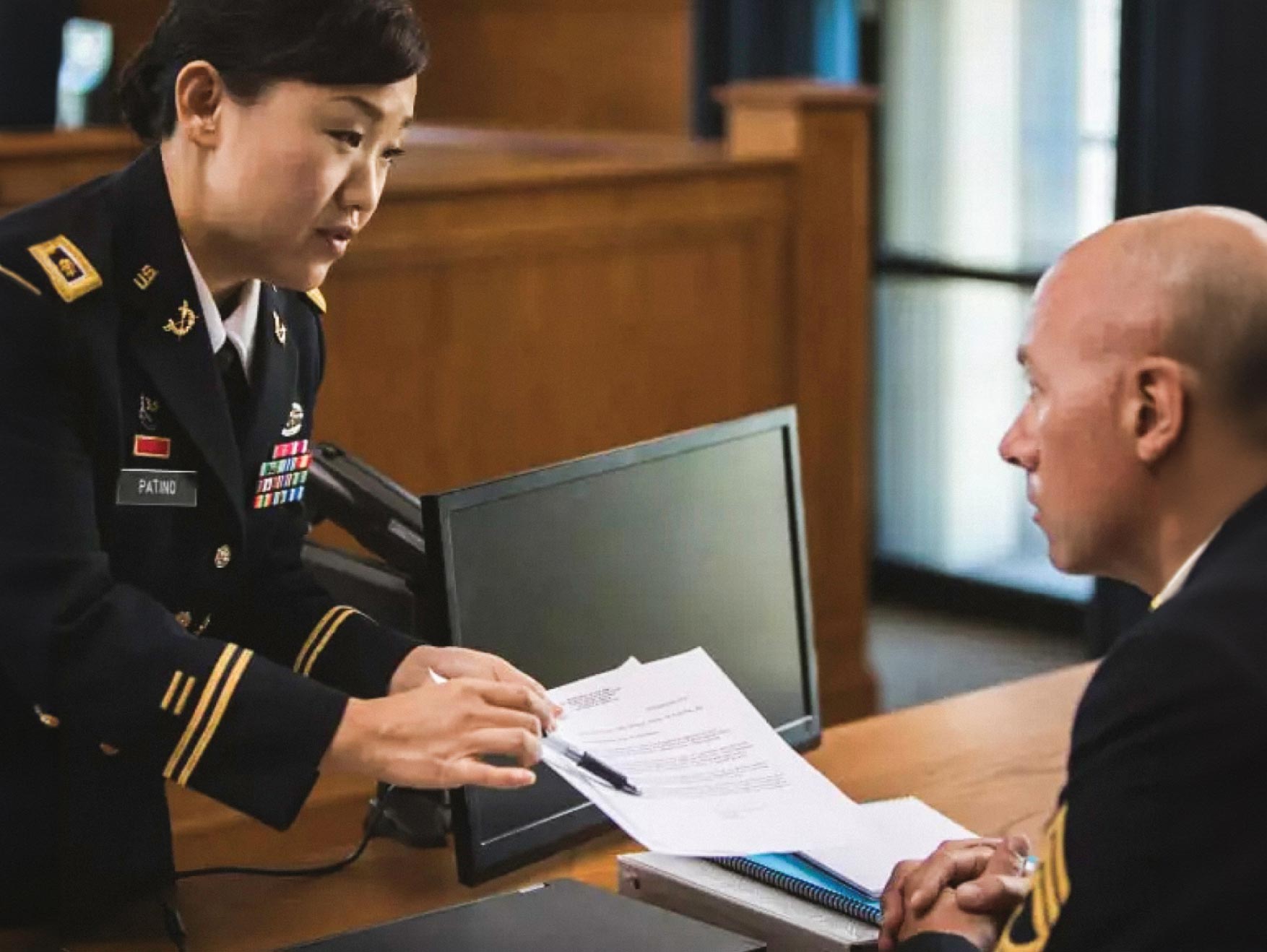Army Law
Protect our nation in Army law.
Leverage your law degree as part of the U.S. Army Judge Advocate General’s Corps, or JAG Corps, serving the nation and advocating for justice as a military lawyer.

What you’ll do as an Army Lawyer.
JAG Corps is a government law organization that defends the Army and its Soldiers in all military legal matters. It’s one of the country’s largest law firms, providing important legal advice to senior Army officials.
Make an immediate impact.
Get early litigation experience and always stay challenged while gaining deeper knowledge of the law. Meanwhile, you’ll hold a respected leadership position in the Army as a commissioned Officer.
Take on diverse casework.
Be involved in meaningful casework that would take years to get in a civilian firm. You’ll receive the unique opportunity to rotate through 10 legal disciplines every few years.
Continue your education.
Grow as a legal professional with access to more than 60 continuing legal education courses every year, plus continued training and leadership development throughout your career.
Army Lawyer requirements
There are certain requirements and steps you’ll need to take to become an Army Lawyer.
-
Have a Juris Doctor (J.D.) Law degree from an American Bar Association (ABA)-accredited law school
-
Have a license to practice law in any state
-
Be a U.S. citizen by the time you commission as an Officer
-
Be under the age of 42
-
Be eligible for a Secret Security Clearance
-
Meet physical and medical fitness requirements
Find your
Find your
Area of
Area of
Expertise.
Expertise.
Areas of legal practice
Change lives—and even make history—in Army Law. Some legal paths are focused on defending individual Soldiers, while others are focused on representing the Army as a single entity.
-
For Soldiers
-
For the Army
Defend individual Soldiers through:
Criminal Law
Serve as a Special Assistant U.S. Attorney, government or defense appellate counsel, or military judge. You’ll be responsible for prosecuting courts-martial or representing Soldiers accused of committing a crime.
Legal Assistance
Provide personal legal advice to Soldiers, families, and retirees in the U.S. and overseas. You’ll get the chance to learn and apply the laws of host nations such as Germany, Korea, and Italy when abroad.
Administrative Law
Provide counsel to Army commanders to ensure legal and regulatory compliance, both under U.S. law and military law enacted by Congress. You’ll work on government ethics, administrative investigations, environmental law, and more.
Operational Law
Provide legal advice to Army commanders on domestic and foreign laws that influence military operations. You’ll review military plans while offering advice on the laws of war and rules of engagement.
SERVE YOUR COUNTRY PART TIME.
You can keep your job at a civilian law firm and serve part-time through the Army Reserve or Army National Guard.
-
Provide legal expertise in a wide range of areas based on current need.
-
Mobilize and deploy to support Army legal operations in the U.S. and abroad.
-
Enjoy flexibility and train periodically, typically just one weekend per month and two weeks during the summer.
-
Get paid for your service and receive many federal benefits, including low-cost medical coverage and retirement benefits.

Army Law Summer Internship Program
Step into the role of an Army attorney and work on real cases at JAG Corps offices worldwide through the Summer Law Internship Program, a competitive 60-day internship open to qualified first- and second-year law students.
Dive into military law.
Work in the JAG Corps as a second-year law student where you’ll assist with real criminal and civil cases. This means conducting legal research, writing briefs, participating in investigations, and interviewing witnesses.
Learn around the world.
Complete your legal internship at one of hundreds of offices across the United States or abroad in countries including Germany, South Korea, Italy, and Japan.
Receive valuable mentorship.
Work under experienced Judge Advocates who will provide advice, insights, and feedback as you work from start to finish on real cases.
EASE THE FINANCIAL BURDEN OF LAW SCHOOL.
The Army offers financial security for active duty Judge Advocates with robust student loan repayment programs plus competitive salary and benefits. This includes student loan repayment of up to $65,000, eligibility for the Department of Education’s Public Service Loan forgiveness program, and benefits under the Post 9/11 GI Bill for continuing education costs.

Benefits that protect your future
Take the first step.
Common questions about Army Law.
Not finding what you need?
Chat with us any time.
What training do Army Lawyers need to complete?
What training do Army Lawyers need to complete?
As a Judge Advocate, you won’t participate in the Basic Training that enlisted Soldiers complete. Instead, you’ll attend the Direct Commission Course (DCC), a six-week rigorous physical, weapons, and leadership course that will prepare you to serve as an Officer.
After completing the DCC, you’ll attend the ten-and-a-half-week Judge Advocate Basic Training Course. Through a combination of classroom instruction and practical exercises, you’ll be immersed in military law and learn every aspect of the JAG Corps’ organization, function, and mission.
Do military lawyers have to pass a fitness test?
Do military lawyers have to pass a fitness test?
Yes, you must meet Army height and weight standards and pass the Army Fitness Test (AFT).
What happens after JAG Officer training?
What happens after JAG Officer training?
After completing the Judge Advocate Basic Training Course, JAG Officers report to one of the Army’s worldwide law offices and immediately begin practicing law.
How do I get into the JAG Corps if I’ve already attended law school and am not in the Army?
How do I get into the JAG Corps if I’ve already attended law school and am not in the Army?
There are two things you’ll need to do as part of the JAG Corps application process: submit an application and interview with a Judge Advocate who is designated as a Field Screening Officer (FSO). Your JAG application should contain your higher education transcripts, resume, personal statement, certificate of good standing, and prior military service documents, if applicable. Optionally, the application can include letters of recommendation and a writing sample.
The selection board will also review your undergraduate and graduate school transcripts, LSAT score, personal statement, and years of law experience. Your moral standing and ability to display leadership will also be considered.
Will the JAG Corps pay for my law school?
Will the JAG Corps pay for my law school?
Yes, through the Funded Legal Education Program (FLEP), the Army covers the cost of law school for up to 25 active-duty Officers and non-commissioned Officers every year. Participants must attend a qualifying school (normally an in-state school or school that offers military members in-state tuition) and serve in the JAG Corps upon graduation. Also, if you have already completed law school and are currently serving as an active-duty JAG Officer, you may qualify for up to $65,000 in Student Loan Repayment.